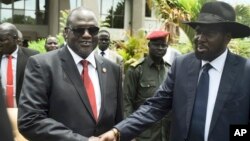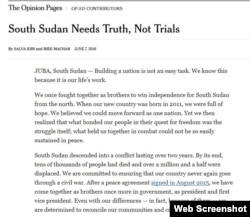Earlier this week, The New York Times published an op-ed bylined by South Sudanese President Salva Kiir and his rival-turned-First Vice President Riek Machar.
In the article, they appeared to argue against creation of a proposed court, composed of both national and international elements, to try perpetrators of atrocities during the past 2½ years of civil war.
Both sides of the conflict are accused of committing atrocity crimes, and accountability for perpetrators is a key demand of many people who survived the war.
A hybrid court to try suspected war criminals is also a major part of the peace deal the two men signed, so the op-ed has sparked controversy in South Sudan.
Back toward violence
But Kiir's spokesman, Ateny Wek Ateny, defended the article, arguing that establishing a hybrid court would push the country back into violence.
"The situation in South Sudan is very delicate,” Ateny said. “The people you would want to take to the court are still armed. And once they know they are not protected, and they are armed, they may cause havoc."
Rights activist Edmund Yakani said the op-ed is an attempt for war criminals in government to avoid justice.
Yakani said if there is no justice, abuses will continue.
"That confirms to me how they, as politicians, are using violence as an option of buying power, because if they could believe that use of violence is not an option of buying power, they could have promoted justice, so that in the future others would never use violence as a way for buying power,” he said. “But I think because now they have the power, they think there is no need for justice."
A push for justice is particularly strong among Machar's supporters, who say they were targeted by Kiir's troops, raising confusion among his camp over the op-ed.
Machar supporters
Juba University political science professor Jacob Chol said if Machar is against the hybrid court, his followers would abandon him.
"If he said that, 'Look, I want to leave justice,' they will look at him and say, 'Look, you are not serious, man.' They will look at him as a liar and a bad politician," Chol said.
Machar's side has since denied knowledge of the op-ed. The first vice president's deputy spokesman, Nyarji Roman, accused Kiir's side of submitting the story without the vice president's approval.
Roman added that the former rebel side, called the SPLM-In Opposition, will cooperate with any court process.
"If there is enough evidence that can link any one of our SPLM-IO members to any crimes against humanity, then we will hand them over to the court. We do not mind," he said.
Kiir's spokesman Ateny admits the president and Machar did not write the op-ed, saying it came from his office with help from international public relations experts.
But he insists Machar approved the article.
New York Times responds
Meanwhile, Ellen Murphy, senior vice president for communications at The New York Times, said in a statement that they received no notice to correct the article from Machar's side.
"This piece came to us through representatives of the government of South Sudan with assurances that they were working on behalf of both President Kiir and Vice President Machar," Murphy said late Thursday.
"Today we learned that Vice President Machar does not agree with the content of the op-ed. We should have sought direct confirmation of the argument of the piece from both parties," Murphy said.
Chol said the episode reveals problems of mistrust between Kiir and Machar, who joined in a unity government in April.
Chol also said the fact that the government stands by the op-ed shows that officials may fear an international court could succeed in prosecuting some members.
"There is a lot of worry from the government perspective because the court is going take a lot of people in there," Chol said.
For South Sudanese, the debate about justice for war crimes is far from over.





